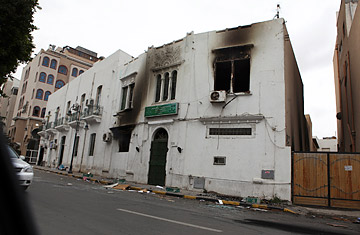
A Revolutionary Committee office, near Green Square, is burned during demonstrations in Tripoli, Libya.
On Tuesday, Feb. 22, I woke up to the scrap-metal sound of a Kalashnikov outside my window. I looked at the clock. It was four in the morning. For three years, I lived in Libya as the only accredited western journalist in the country. By Wednesday, I would leave a city that was no longer itself.
This is how it all began to change. The news of the Feb. 15 uprising in Benghazi and Cyrenaica, hundreds of miles to the east, had trickled into the capital — as did accounts of the regime's attempts to crush it. We journalists have always been under tight control in Libya. But just a few days before the uprising in Tripoli began, it got a little tighter. I had been taken in by plainclothes security forces — a kind of warning. They blocked my cell phone number and did the same to three other colleagues.
On Saturday, Feb. 19, a day before the rebellion reached the capital, I met a Libyan friend who works for a foreign diplomatic mission. She was stocking food supplies. She was afraid. "Since Benghazi and Cyrenaica are at war," she tells me, "Tripoli has become a place where they look at you with suspicion. Nobody knows which side to be on. Your neighbor could become your executioner." Then, with tears in her eyes, she told me about two children she knew, aged 11 and 13, killed in Benghazi.
I called friends, sources. I wanted to know how they were, what they thought would happen. They were all afraid, locked in their homes, waiting. Then I got a call from A., a police officer I'd known for three years. He told me of six inmates killed in al-Jadaida prison in Tripoli. They were from Benghazi. I asked, "Was it retaliation against their families or an attempt to quell a revolt?" He did not answer. He was clearly a cop who had passed to the other side, a dissident. He was afraid, yet determined, and when I told him to be careful he gave me an answer I will never forget: "This is the blood we have to shed for our freedom." I too began to fear.
Then, the telephone company cut off communications completely. On Sunday night, the fighting began. About 3,000 people from the surrounding towns flocked to the center of Tripoli. They set fire to cars and garbage cans, and burned the police posts that lined the street. There were shouts, and the sound of horns. At about midnight, Saif al-Islam, Gaddafi's "reformist" son, gave a speech. It captured everybody's attention, but disappointed those who believed in him, who thought he embodied the possibility of democratic change.
I took refuge at the house of a friend. From its roof, I watched more anti-Gaddafi demonstrators arrive late Monday afternoon. They came down from the surrounding cities, members of clans that have long harbored anti-regime sentiments. In the place of the green flag of Muammar Gaddafi's Libya, they waved white banners and shouted slogans in Arabic. But before they came, I saw helicopters pass, transporting troops, African mercenaries paid by the regime to do its dirty work.
For three nights, it would be urban guerilla warfare, a battle devoid of images, unreported, obscured by a regime that has no love for journalists or those who collaborate with them. It was a battle recounted in the sound of gun shots and of the trails of fire left by the passing demonstrators.
By then, it was clear to everyone: Tripoli was in chaos. Between supporters and protesters, police and army, security forces and mercenaries, nobody knew who to believe. For three mornings, the first rays of sun chased away the shadows of nocturnal combatants, men armed with rifles patrolling the neighborhoods in search of anti-Gaddafi demonstrators. With first light, there was our race to the store for supplies. At night, there was apprehension as loyalists hunted those opposing the regime as Gaddafi brutally reimposed control.
Within 48 hours of the fighting, thousands of expatriates began leaving the capital. Pouring into the airport, they occupied every possible space, parking lots, roads, sidewalks. Inside was a carpet of human fear. Among them were Tunisians, Egyptians, Algerians, Syrians, nationalities accused by Gaddafi's supporters of having been the spark that ignited the revolt in Libya. Together with them are many Asian workers employed in the construction yards, which have been attacked and raided.
Then, there are the Europeans like myself. Organized in groups by our embassies and shuttled through the city's impromptu checkpoints to the airport, we were evacuated to our home countries. Italy even sent a charter flight to take us back. I took my place in a large group of people waiting to depart. Staying in Libya was no longer safe. When my plane finaly took off, the applause was liberating.
Francesca Spinola is a correspondent for ANSA, the Italian news agency. Based in Libya since July 2008, she covers the Mediterranean and Africa and has been published in L'Espresso and La Repubblica, and has appeared on the news network France24
